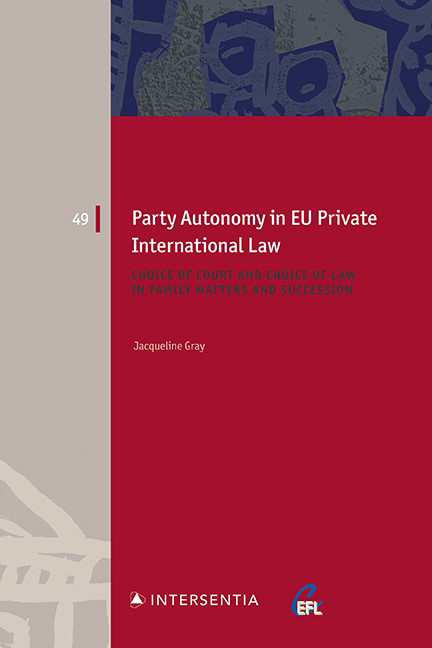 Party Autonomy in EU Private International Law
Party Autonomy in EU Private International Law Chapter 8 - Subsidiary Forms of Party Autonomy
Published online by Cambridge University Press: 25 May 2021
Summary
INTRODUCTION
This book has now reached third and final chapter concerning the content of choice within the EU private international law framework relating to family matters and succession. As discussed in the Introduction, this evaluation of party autonomy extends to the outer reaches of party autonomy as conceived within the current setting, whereby the free will of the parties serves a residual and specific role.
Two groupings of subsidiary party autonomy provisions will be examined and evaluated in this chapter, both of which concern the determination of jurisdiction: party autonomy and judicial discretion in the transfer and/or assumption of jurisdiction (8.2.) and the acceptance of jurisdiction by a party through entering an appearance in a court which has been seised of jurisdiction by another party (8.3.) The concluding synthesis (8.4.) will also emulate what has come before, providing an overview of the findings, before highlighting the added value of these provisions and the gaps that have been identified to be further addressed.
PARTY AUTONOMY AND JUDICIAL DISCRETION
The first of the two types of provisions to be discussed in this chapter concerns party participation in jurisdictional mechanisms, based on an interplay between party autonomy and judicial discretion. These provisions have been established for the purposes of proceedings involving parental responsibility in Brussels II bis, under Article 12(3) (8.2.1.) and Article 15 (8.2.2.), as well as Articles 6(a) and 7(a) of the Succession Regulation (8.2.3.). Whilst the first provision involves a prorogation by the parties in conjunction with a high degree of judicial involvement, the two latter mechanisms are primarily governed by judicial discretion, with the will of the parties serving a very subsidiary role in this setting (forum non conveniens provisions).
ARTICLE 12(3) OF BRUSSELS II BIS
Alongside the linkage of jurisdiction in matters of parental responsibility arising in conjunction with a divorce or legal separation under Article 12(1), Article 12(3) of the Brussels II bis Regulation provides a separate, distinct opportunity for prorogation of a court in the context of autonomous parental responsibility proceedings.
- Type
- Chapter
- Information
- Party Autonomy in EU Private International LawChoice of Court and Choice of Law in Family Matters and Succession, pp. 191 - 208Publisher: IntersentiaPrint publication year: 2021
